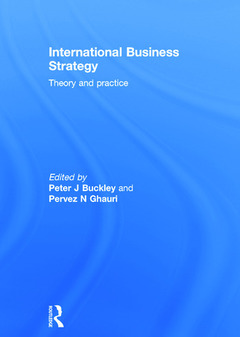Description
International Business Strategy
Theory and Practice
Coordinators: Buckley Peter J, Ghauri Pervez
Language: English
Subjects for International Business Strategy:
Keywords
Global Strategy; Mike Peng; International Strategy; Ta Ge; Pr Ic; Te Ch; Va Ri; Pay For Performance; Uncertainty Avoidance; Chinese ODI; Reddy’s Laboratories; Daewoo Motor Company; Develop Country MNEs; Chinese MNEs; UniCredit Group; Indian Pharmaceutical; Firm Specific Advantage; Indian Pharmaceutical Industry; Internalization Decisions; Indian Pharmaceutical Companies; Internalization Theory; Foreign Investment Decision Process; FDI Location Choice; Knowledge Acquisition; Trading Rooms; DCM Experiment; Cee Region; FDI Experience
Publication date: 02-2015
· 17.4x24.6 cm · Hardback
Publication date: 02-2015
· 17.4x24.6 cm · Paperback
Description
/li>Contents
/li>Readership
/li>Biography
/li>
With stagnated demand in many home economies, the need to internationalize and exploit foreign market opportunities has never been more paramount for businesses to succeed at a global level. However, this process raises a number of questions, such as: can firms use their knowledge of one market in the next? Can firms pursue internationalization on several fronts at the same time? How should firms handle cultural and institutional differences between markets?
This textbook provides students with the core research in international business and strategy, including organization, efficiency, external relationships and the challenges found in an increasingly multicultural world. Each part begins with a presentation of the issues and controversies faced in that particular area, followed by a synthesis of the research which provides avenues for future research. To facilitate and encourage further debate and learning, each part also includes at least one original case study.
Compiled by two of the World's leading scholars of international business, and supplemented with critical commentaries and a range of integrative case studies, this comprehensive textbook provides advanced students of international business and strategy with a resource that will be invaluable in their studies and beyond.
Part I: Basic Concepts of International Business: What is International Business? 1. Introduction 2. The Foreign Investment Decision Process 3. International Investment and International Trade in the Product Cycle 4. The Uppsala Internationalization Process Model Revisited: From liability of foreignness to liability of outsidership 5. The Eclectic Paradigm as an Envelope for Economic and Business Theories of MNE Activity 6. The Internalisation Theory of the Multinational Enterprise: A review of the progress of a research agenda after 30 years Case Study 1: Internationalization of Brewery Companies: The case of Carlsberg Part II: Global Strategy 7. Introduction 8. Globalisation, Economic Geography and the Strategy of Multinational Enterprises 9. Semi-Globalisation and International Business Strategy 10. Do Regions Matter? An integrated institutional and semiglobalization perspective on the internationalization of MNEs 11. Do Managers Behave the way Theory Suggests? A choice-theoretic examination of foreign direct investment location decision-making 12. Towards More Realistic Conceptualisations of Foreign Operation Modes Case Study 2: Global Strategy – Danone, a French multinational expanding into the global market Part III: Organizing the Multinational Enterprise 13. Introduction 14. Organizing for Worldwide Effectiveness: The transnational solution 15. Firm Resources and Sustained Competitive Advantage 16. Knowledge, Bargaining Power and the Instability of International Joint Ventures 17. Mimetic and Experiential Effects in International Marketing Alliance Formations of US Pharmaceuticals: An event history analysis Case Study 3: Organizing the Multinational Enterprise: Renault-Nissan-Daimlar: A Global Strategic Alliance Part IV: External Relationships 18. Introduction 19. Overcoming the Liability of Foreignness 20. Down with MNE-Centric Theories: Market entry and expansion as the bundling of MNE and local assets 21. Network View of MNCs' Socio-Political Behaviour 22. Weight Versus Voice: How foreign subsidiaries gain attention from corporate headquarters Case Study 4: Axis Communications: Building the Global Market for Network Surveillance Cameras Part V: Culture and International Business 23. Introduction 24. Cultural Distance Revisited: Toward a more rigorous conceptualization and measurement of cultural differences 25. Transforming Disadvantages into Advantages: Developing-country MNEs in the least developed countries 26. Merging Without Alienating: Interventions promoting cross-border organizational integration and their limitations 27. Psychic Distance and Buyer-Seller Interaction Case study 5: UniCredit Group: A bank goes East Part VI: Emerging Markets 28. Introduction 29. The Determinants of Chinese Outward Foreign Direct Investment 30. Market Driving Multinationals and their Global Sourcing Networks 31. Strategies that Fit Emerging Markets 32. The Hidden Risks in Emerging Markets Case Study 6: Internationalisation of Indian Pharmaceutical Multinationals
Peter Buckley is Professor of International Business at the University of Leeds, UK
Pervez Ghauri is Professor of International Business at Kings College London, UK




